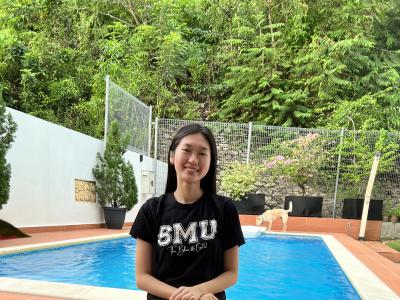
Graduate school is a major investment in one’s professional future. Here at ValueChampion, we hope to make this financial decision more approachable. By interviewing students and sharing their stories, we hope to shed light on key decision making factors for prospective students.
Following the completion of his double degree in Bachelor of Science (Economics) and Bachelor of Business Management (BBM) at SMU and several years in the working world, Joel Ng decided to return to his alma mater to pursue a Master of IT in Business (MITB). In our interview, we asked him what made him choose this degree and learnt more about how he was able to finance this career investment.
What influenced you to pursue the SMU MITB? What excites you intellectually?
I had been working about a year in Bloomberg before I realised that I needed to learn programming to efficiently work with the large amounts of data that I deal with every day. Books and massive open online courses (MOOCs) served me well for about 3 years, as I quickly picked up a repertoire of languages and various layers of the tech stack, but eventually realised that all the code I was writing was always for a tactical context, reacting to immediate problems, rather than creating actual applications to meet business needs or doing real data analytics to derive novel, actionable insights.
I felt that there was no way to work my way into roles where I would get to do that without formal qualifications, so I shopped around for a Computer Science Master’s programme. I eventually settled upon the SMU MITB because I felt an offline course from an institution that is well-recognised locally would help me learn better (in contrast to the 20+ MOOCs I had taken up to this point). Also, I regarded SMU as my “home ground”, so I wouldn’t have to re-learn the whole protocol/mode of learning, and it gave me more opportunities to participate as an alumnus in SMU Ardiente (SMU’s latin ballroom dance club).
Did you consider any other schools or programmes? If so, why did you ultimately choose SMU?
Since I had already made up my mind to do an offline course, SMU was the natural choice as I didn’t want to travel all the way to NUS/NTU for night classes (I work in Raffles Place and stay in Tanah Merah).
Within SMU, I briefly considered the Masters of Applied Information Systems (now known as the Master of Science in Computing), but knew I wouldn’t have the time or presence of mind as a part-time student to commit to a research thesis. Having done a double degree in business and economics, there was nothing outside of information systems that really interested me. Finally, it so happened that SMU Associate Professor Michelle Cheong, who is currently the Director of MITB (Analytics) programme, was my instructor for CAT (Computer as an Analysis Tool), during my undergraduate days, and I had a great experience learning under her, so that gave me more confidence that MITB would be a solid course.
How would you describe your experience in the SMU MITB?
Well I can’t say that it’s been ideal. The first term was really difficult, because my 4-year-old working world brain really wasn’t receptive to the 3- to 3.5-hour class format anymore, and it took me almost all term to rewire my brain to get the engine that had served me so well during undergraduate days going again.
On the other hand, most of the instructors had great material, teaching style and personality. Notable mentions include:
- Assoc Prof Kam Tin Seong, whose brutal assignments in Data Analytics Lab frustrated me immensely but also allowed me to ramp up my analytics skills extremely rapidly
- Assoc Prof Debin Gao, who marched us through the tenets of cybersecurity with military precision and just the right level of theory and hands-on work
- Mr Gerard Tong, who combined old-school trading floor tradition with his proprietary online trading simulation game to teach us all about trading technology and gave us the chance to create our own algorithmic trading bot
- Asst Prof Dai Bing Tian, whose inexorable delivery of machine learning theory and practice challenged me to keep following his advanced maths and Python code to avoid the feeling of despair
- Prof Johnson Poh, who stepped up to teach us about big data and whom I witnessed being very encouraging and helpful to weaker students in Statistical Analysis with R
What has been your favourite module so far, and why?
It’ll have to be the 2-module combination of Trading Tech & Ops and Algo Trading taught by Gerard Tong (I believe the module names may have changed since then), as not only did Gerard bring years of actual trading experience and anecdotes to the lecture theatre, but he also delivered every concept with passion and made sure to diligently explain every concept, from trading conventions to option valuation methodologies, with colour and attention to the weaker students in class. The centrepiece was, of course, his online trading simulation games, which allowed us to effectively role play as both human and algorithmic traders, and trade against each other with simulated event injects, resulting in a unique experience that was both highly educational and extremely enjoyable.
What type of extracurricular activities are you involved with?
As mentioned above, doing my Master’s in SMU allowed me to be more involved Ardiente, which I co-founded in 2011, and I helped out in trainings to coach the freshies, as well as participate as a performer in the annual productions of 2015 and 2016.
Did you work before going back to school? If so, where did you work, and how did it influence your decision to return to school for a graduate degree?
At the time of enrolling into MITB, I had worked in Bloomberg for about 4 years. I knew I needed some formal qualification to work my way into a proper development job, rather than just doing ad hoc coding to solve immediate problems with software/data platforms that had been invented elsewhere. MITB was attractive because of the focus in the finance domain, as I knew that regardless of what kind of programming I learnt, I wanted to stay within the finance/investment sector.
What are your career aspirations?
I’m actually more or less where I’d like to be. While I was doing my MITB, I moved to GIC to take on a real development job, where we were creating a data platform for market data for research purposes. Currently, I am in Arisaig Partners, an independent fund management company, heading up a team of hybrid data analysts and full-stack developers, doing ad hoc research on alternative datasets to support the investment research process, as well as creating bespoke web apps and data stores for internal consumption. So this allows me to leverage on my finance domain knowledge, maximise time spent coding, and challenges me in the area of managing both an in-house team and external hardware and software vendors. I guess it would be slightly cooler if there was some quant/algo component to my role, but that’s not something I want badly at this time.
How has SMU helped prepare you for this type of career?
I suppose it’s only fair to speak about this in terms of my 7 years of study in SMU, both undergrad and postgrad. Of course, MITB has given me the technical skills and confidence to function as a data analyst and app developer in my current environment, but I know that a lot of the management and soft skills that I learnt in my undergrad BBM has prepared me for the management challenges I face today. For example, communication skills are essential for managing any sort of team, especially in my current context with lots of technological jargon being bandied about—the organisational behaviour and human resources and communications courses from my SMU undergrad days have taught me to how to listen and persuade rather than focusing on just expressing my viewpoint unabashedly.
How are you financing your graduate degree? What resources did you use to learn about financing options?
Funny story‚ I actually applied for and obtained full sponsorship from Bloomberg for the full cost of the MITB. But [I subsequently] resigned and paid [them] back in full. So, essentially, I self-funded my MITB course out of personal savings. Luckily, I had been working for about 5 years at that point, so I had more than enough saved up. I saw it as an investment in myself, and so far I have been hard-pressed to find another investment opportunity with as good an ROI!
Where do you see yourself in 5 years?
Hopefully still working here in Arisaig and taking it to the next level by playing more of a technology expert/consultant role when we evaluate businesses to invest in! I do want to finish my CFA (working on my Level II now) and maybe tackle a proper MBA to cap off my formal education. And I hope to be a better manager, knowing when to guide and when to be hands off for my team and let them figure things out for themselves, just like what some of the good profs in MITB have done with me.
This article was originally published on ValueChampion and reproduced with permission.


